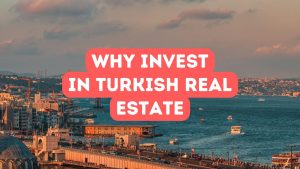Navigating the Turkish property market can be both an exhilarating and complex endeavor. At Bosphorus Brokers, we understand the importance of thorough knowledge and strategic insights when it comes to real estate investments. The Turkish property market offers a unique blend of opportunities, driven by its growing economy, strategic geopolitical location, and diverse cultural heritage. Whether you’re an investor seeking high-return opportunities, a family looking for a dream home, or a business searching for strategic commercial spaces, understanding the market dynamics is crucial. In this article, we will delve into the various factors that influence the Turkish property market, from economic indicators and government policies to regional trends and investment hotspots. Join us as we unravel the intricacies of this promising market and help you make informed decisions tailored to your specific needs.
Current Trends and Market Predictions for Turkish Real Estate
The Turkish real estate market has experienced significant growth in recent years, underpinned by a dynamic blend of local demand, foreign investment, and robust tourism activity. Istanbul continues to be a hotspot for property purchases, drawing investors with its mix of historical charm and modern infrastructure. Meanwhile, emerging cities like Ankara, Izmir, and Antalya are gaining traction due to improved connectivity and attractive investment incentives offered by the government. Furthermore, the pandemic has accelerated interest in spacious, suburban properties as remote work becomes more prevalent. Analysts predict that the focus on sustainable and smart housing options will shape the future of the Turkish property market, making now an opportune moment for savvy investments.
Government policies and economic indicators play a pivotal role in shaping the Turkish property market landscape. Recent initiatives, such as citizenship by investment schemes and tax incentives for foreign buyers, have substantially boosted international interest. Additionally, favorable exchange rates have made Turkish real estate a lucrative prospect for global investors. Moreover, ongoing infrastructure developments, including new airports, highways, and public transportation projects, are enhancing regional accessibility and encouraging real estate growth. Economic factors like inflation rates, mortgage availability, and GDP growth also heavily influence property values and investment returns. Prospective buyers and investors must stay informed about these regulatory and economic shifts to navigate the market successfully.
Regional trends and investment hotspots further illustrate the diverse opportunities within the Turkish property market. Coastal regions such as Bodrum, Fethiye, and Alanya are particularly appealing for both holiday homebuyers and retirees due to their scenic beauty and high quality of life. Additionally, these areas are seeing rising interest for short-term rentals, driven by a strong tourism sector. Emerging urban areas are also gaining attention; for instance, regions in Eastern Turkey are becoming attractive for industrial and commercial real estate, spurred by government-backed regional development programs. Understanding these localized trends helps investors identify lucrative opportunities and avoid saturated markets. Bosphorus Brokers is committed to providing detailed insights tailored to our clients’ ambitions, ensuring they capitalize on the vast potential across various Turkish locales.
Key Factors Influencing Property Investment in Turkey
One of the main factors influencing property investment in Turkey is its robust and growing economy. Over the past decade, Turkey has seen significant economic expansion, driven by a young and dynamic population, increased foreign direct investment, and an expanding middle class with rising purchasing power. This economic vigor creates a fertile ground for the real estate market, as demand for both residential and commercial properties grows concurrently. Furthermore, the Turkish government’s commitment to infrastructural development, including new airports, roads, and public transportation networks, enhances the appeal of various regions, ensuring sustained investor interest and long-term growth prospects.
Another key factor shaping property investment in Turkey is the country’s advantageous geographic location, which links Europe and Asia. This strategic positioning has established Turkey as a critical hub for international trade, tourism, and business, thereby elevating the demand for commercial and residential real estate. Additionally, Turkey’s rich cultural heritage and picturesque landscapes across its diverse regions—from the Mediterranean coast to the historic allure of Istanbul—attract a myriad of tourists, expatriates, and retirees. This constant influx of visitors and new residents not only boosts the hospitality and rental markets but also fosters a thriving environment for property appreciation, making Turkey an increasingly attractive destination for discerning investors.
Government policies and incentives are also pivotal in shaping the Turkish property market. Over the years, the Turkish government has introduced various measures to facilitate foreign investment in real estate, such as the reciprocity law that allows foreign nationals to acquire properties with relative ease. Additionally, citizenship-by-investment programs offer further incentives, granting citizenship to individuals who meet specific property investment criteria. These favorable policies drive substantial foreign interest and capital influx into the market. Moreover, tax reliefs and financing options, coupled with legal frameworks that protect investor rights, provide a secure and encouraging environment for property investments. As a result, Turkey continues to witness robust growth in both domestic and international property transactions, solidifying its status as a booming real estate market.
Navigating Legal and Financial Aspects of Buying Property in Turkey
When it comes to purchasing property in Turkey, understanding the legal and financial frameworks is essential for a smooth and secure transaction. At Bosphorus Brokers, we emphasize the importance of due diligence, which includes verifying the title deed, understanding zoning laws, and ensuring that the property is free from any legal disputes or encumbrances. Additionally, foreign buyers need to be aware of restrictions on property purchases, such as limitations on buying agricultural land and properties in certain military zones. Financially, prospective buyers should also consider the various taxes and fees associated with property transactions in Turkey, including the deed transfer tax, Value Added Tax (VAT), and annual property taxes. By navigating these legal and financial aspects with the help of experienced professionals, you can safeguard your investment and avoid potential pitfalls.
Another crucial financial consideration is securing financing options if you’re planning to purchase property in Turkey. While local banks do offer mortgage options to foreign buyers, the terms and conditions can vary significantly from those available to Turkish nationals. It is essential to understand the interest rates, loan-to-value ratios, repayment periods, and any additional costs that may be involved. Working with a knowledgeable broker, like those at Bosphorus Brokers, can help you navigate these complexities and find the most favorable financing options tailored to your specific financial situation. Moreover, it’s important to account for currency exchange rate fluctuations, as they can impact the overall cost of your property investment. By meticulously planning your financial strategy, you can ensure a more seamless and beneficial property purchasing experience in Turkey.
Finally, understanding the intricacies of property ownership and maintenance costs is paramount when investing in Turkish real estate. Ownership responsibilities extend beyond the purchase price, encompassing ongoing maintenance fees, utility bills, and potential renovation costs. It’s important to budget for these recurring expenses to ensure the long-term sustainability of your investment. Additionally, navigating landlord-tenant laws is a key aspect for those who plan to rent out their property. These laws govern rental agreements, tenants’ rights, and eviction procedures, and having a clear comprehension of them can mitigate legal risks and enhance rental income stability. At Bosphorus Brokers, we offer comprehensive property management services to help you efficiently manage these aspects, providing peace of mind and allowing you to focus on maximizing your investment returns.







